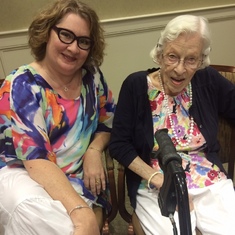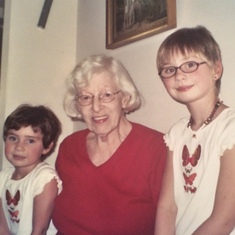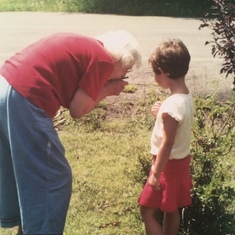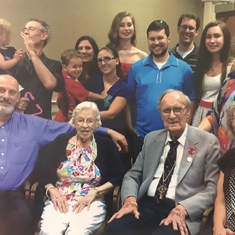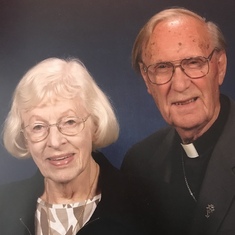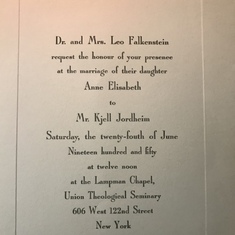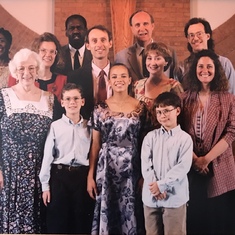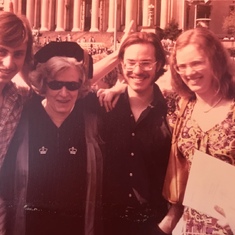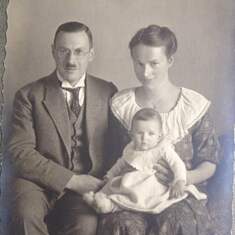Dr. Anne E Jordheim, 97, passed away on July 19 at the Lenoir Woods Long Term Care facility in Columbia, MO.
Anne was born on May 24th, 1923 in
Gotha, Germany as the only child to Dr. Leo Falkenstein and Dr. Auguste Hedwig Katharine Oeltze von Lobenthal. Anne’s parents were medical doctors who ran a clinic in the village of Siebleben next to Gotha. Anne’s father came from a Jewish family. His father was a Rabbi and agriculture teacher who taught students to create beautiful home gardens full of food and flowers. Leo’s family had been in the linen and porcelain manufacturing businesses in Germany for many generations. Anne’s mother came from a family of conferred nobility with a long line of military men, preachers, doctors, and civil servants. Anne’s grandfather was a commander in the Prussian Cavalry. Anne’s grandmother was the great-granddaughter of the famous and prolific Baroque composer
Gottfried Heinrich Stoelzel, a colleague of J.S. Bach and Antonio Vivaldi. His aria from one of his many operas
“Bist du bei mir”, which was earlier attributed to Bach and listed as BMV 508, is considered one of the most beautiful pieces of music from the Baroque period.
Anne’s father had been a Captain in the German Army Medical Corps during
World War I and worked in the field hospitals and infectious disease wards. He really just wanted to be a pediatrician. Anne’s mother was one of a few women who became a doctor in the period just after the First World War. She was also the first woman in the city of Gotha to have a vehicle driver’s license. Anne’s parents met in a clinic where they both worked in 1921 and fell in love.
Anne studied hard at school and also became a very good violinist at an early age. She had a lifelong love of Classical and Baroque music. Her childhood home had beautiful gardens that her father tended where she lived a carefree early life. Life after the First World War was not easy. Her parents were often paid in livestock or food as cash was scarce and unpredictable because of the
unstable currency markets. But still they managed to build a beautiful home and clinic and became an influential and important part of the local community.
Anne was determined to become a doctor like her parents, but the rise of Fascism and Racism in German in the 1930s stopped that dream. By 1935 her father was forbidden to work and the family tried many ways to evade the
anti-Jewish laws. Since Anne’s mother was not Jewish, they managed to maintain control of the clinic for a few years and managed to scrape by. In 1938 Jews in her area were being arrested and hauled off to detention centers. The
Kristallnacht happened that November. Her father was tipped off that he might be next. Anne’s mother drove Anne’s father to Berlin in the middle of the night because it was still possible to evade arrest there. The arrest campaigns came later to Berlin. He could hide with friends and relatives while they tried to figure out what to do next.
One of Anne’s mother’s brothers was a mid-level Nazi party official who agreed to pull some strings and get Anne’s father an exit visa to England early in 1939. This would have been a difficult thing to accomplish. The plan was for Anne and her parents to get visas to America through the help of a cousin of Anne’s father who lived in New York and ran a travel agency that did a lot of business with the state department. The USA was not accepting “Hebrew” or German refugees which complicated the matter and made the back channel access that Anne’s father’s cousin had of utmost importance. Then the Second World War broke out and ruined that plan for the escape and reunification of the family.
Anne’s father was arrested in England as an enemy national and held in an internment camp at
Huyton near Liverpool. Eventually the British government realized the people they had interned were refugees and not a threat. That made it possible for a visa to be arranged for him to go to America in 1940. He traveled on the
SS Volendam which also had 320 children on board that were being evacuated for Halifax in Canada as a part of the work of the Children's Overseas Reception Board. The Volendam was torpedoed off the coast of Ireland on the second night of the voyage by the German attack submarine U-60. Two torpedoes struck the boat, but fortunately one did not explode. The ship took on water from the damage of the one torpedo explosion and began to list. Luckily only one person died in the attack. The rest of the passengers and crew went to the lifeboats and were picked up by other ships and evacuated back to England. Anne’s dad successfully made it to America a month later.
In the meantime, Anne and her mother were evicted from their home so the Nazi party could use it for their own purposes. Anne and her mother were sent to live in a small two-room apartment near a clinic Anne’s mother was forced to work at. Anne’s mother was also compelled to work as a school nurse at a Catholic School for girls. It was hard living during wartime. Anne said once that she would never eat lentils again in her life as she ate them at almost every meal with a lard sandwich. Many years later people who had lived in Gotha through the war and knew Anne’s parents told Anne that the job at the clinic and the job at the school were arranged by people protecting her and her mother so that Anne's mother became an essential worker who could not be arrested or deported. In many places the Christian spouses of Jews were also arrested, deported and murdered. Even in times of horrible racism and fascism, there are people who, although they may feel powerless to stop the nationwide trend and the madness of people in power, do manage to break a few rules or play a few tricks on the powerful in order to protect a friend or family member.
Anne continued her studies in spite of the fact that the anti-Jewish laws made it illegal for half-Jewish children to go to school. The school administrators always seemed to lose the paperwork for her expulsion and then forget to start new expulsion paperwork. Anne’s uncle continued to pull strings to protect them and continued to try to get Anne and her mother exit visas. One condition the government placed on granting the exit visa was that Anne should finish her schooling for her university entrance exams. The Gymnasium exams were equivalent to College entrance exams in the USA that required High School and post High School course work. The catch 22 was that she was not allowed by law to go to school. But since the school never got around to expelling her, she finished her studies, and exit visas were granted. Again, this was no small feat.
In July of 1941, Anne and her mother flew from Munich to Barcelona and then traveled to
Lisbon where they boarded a ship in August for New York. They were only allowed to bring two suitcases each and two dollars each when they left Germany. They had to agree to forfeit all of their other assets and belongings. Anne chose to bring her violin with her and only one suitcase. The ship they arrived on was the last passenger ship bringing refugees into the US before the US entered World War 2 in December of 1941. She and her mother left in the nick of time.
There was a very happy reunion in New York where Anne’s father was waiting. He had been living with the support of his cousin and the Presbyterian Church refugee mission. The family settled into a small apartment on the east side of Manhattan in the neighborhood of Yorkville that would become known as the Fourth Reich because so many German refugees lived there. Then as now, there were many anti-immigrant efforts that complicated the desire to build new lives, and the term “Fourth Reich” was not always said by people in a nice way. It was also a sad time because Anne’s father’s brother and his family and Anne’s father’s mother could not get out of Germany. They were eventually murdered in
Theresienstadt and Auschwitz in 1943 and 1944.
Anne’s father worked as an orderly in a hospital to learn English and to stay involved in medicine as he arranged to retake his medical studies in order to become a doctor in New York. It was 1950 before he was licensed to practice as a pediatrician in New York and realized his life goal of providing care to infants and children. Anne’s mother worked as a seamstress to help support the family while she figured out the ropes and red tape that were required to get licensed to practice. She was such a good surgeon that sewing and repairing clothing became a serious skill. The family moved to the west side of Manhattan to
Hamilton Heights. Anne’s mother became a general practitioner as she was in German and was the “village doctor” in the neighborhood until she stopped practicing in 1975 or so.
Anne worked as a maid and domestic when she first arrived. She graduated from the School of Scientific Housekeeping and completed the course in Serving and Waitress training in October of 1941 only a few months after arriving. At the time it was quite the fashion for wealthy families to have a Jewish (or half-Jewish) domestic on staff. She continued to work as a domestic for wealthy families while she attended Washington Irving Evening High School. Her coursework from Germany did not count towards college admission in New York and she had to get a High School diploma to get into college. She still wanted to become a doctor. But her parents thought that the conditions in New York for female physicians were unfavorable or near impossible and put her on the path of nursing. Anne got her RN from the Cochran School of Nursing at St. John’s Riverside Hospital in 1945. She then attended Teachers College at Columbia University and was awarded a Bachelor of Science in Nursing in 1948 and her Masters of Arts in Health Education in 1950.
She worked as a nurse in maternity wards. She also worked in the Polio wards during the Polio outbreaks in 1946 through 1949. Her experience with Polio patients motivated her to follow a path in health education to try to prevent future outbreaks of preventable infectious diseases. She was present for the 1957 and 1968
influenza outbreaks and helped work through them. She read everything about the H1N1, Ebola, SARS and MERS outbreaks as they happened. Even though her decline and her occasional dementia affected her, she was still bright enough in her last few months to be flabbergasted and infuriated that the Coronavirus had been allowed to turn into a crushing pandemic. The isolation and loneliness of the protective quarantine at Lenoir Woods was very difficult for her.
In 1950 she met a student at a Lutheran Student Association (LSA) gathering who had come to New York from Norway on a scholarship funded by the Marshall Plan so he could study divinity at Union Seminary across the street from Columbia College. Anne told the story this way: she was carrying a tray of sandwiches up the stairs to go to the gathering and she saw this guy who was so handsome that she dropped the tray. That was Kjell Jordheim, who she would marry in June of 1950. The way he told the story was that he was thunderstruck by how beautiful she was and made her drop the tray because he got distracted and stumbled on the stairs. They would live to celebrate their 69th wedding anniversary together.
When Kjell finished his degree, he and Anne spent time in Philadelphia and Chicago at internships he completed before his student visa ran out. He returned to Oslo, Norway in early 1951 with Anne. There they started a family. A daughter Kristin arrived first in 1951. A son Jon Steffen arrived next in 1952. Their second son Jan arrived in 1955. Unfortunately, Jon Steffen became ill as an infant and despite bringing him to see experts in New York and trying many approaches, he passed away in December of 1956.
Anne kept busy doing nursing work, teaching, writing, and learning Norwegian. She taught classes through the
Norwegian Red Cross in Hospital English and Maternity Nursing. She translated medical material from English to Norwegian. She also started a long career as a writer by submitting articles about “Nursing in Norway” to nursing Journals in America, England, Germany, and Switzerland.
During this time Kjell worked for the Norwegian Refugee Service helping to settle refugees from the upheaval of World War II in Norway. He traveled to Germany to interview people who were applying to live in Norway. Anne accompanied him on a trip in 1953. She was able to visit her mother’s mother and her cousins on her mother’s side who she had not seen since the escape from Germany. She also visited her home town and got to reconnect with school friends and neighbors. At this time, her hometown of Gotha was in the
USSR Zone of occupation and under the East German GDR regime. This was before the Berlin wall went up, so travel was not very difficult. It was heartbreaking for her to see the devastation and the ruin in the bigger German cities. It was heartbreaking to know she would not be able to visit her Father’s family.
By 1958, Kjell was restless to use his divinity training and degrees to become a parish pastor. There were more pastors than vacancies in Norway. The cold war was heating up and Norway shared a border with the USSR. It was well known what happened to people of Jewish extraction in areas controlled by the USSR. They were concerned for their safety and for the safety of their children. Anne and Kjell decided to go on another big adventure. He accepted a call to a church in rural northern Wisconsin. In 1958, Anne, Kjell, and their two young children boarded a passenger liner and headed to the USA. It was a tough decision as Anne really enjoyed her life in Norway. She had many friends. Kjell’s parents and brothers and their families made a good extended family unit and although the country was still very poor after its recovery from the German occupation and there were scarcities, it was a pleasant life.
Country life in Wisconsin was very different from the busy metropolis of Oslo. The closest neighbors were a half a mile away. But Anne did what she did best: nursing, teaching, and writing. She became the Assistant director of nursing at a local hospital and taught other courses in first aid and infectious disease control. She wrote a column for one of the national Lutheran magazines about living as a pastor’s wife in rural Wisconsin. Anne and Kjell also had their fourth and final child when a son Tron arrived in 1959.
Wisconsin living did appeal to Anne. There were many fun camping trips, tours around the Great Lakes, drives through the Black Hills, and into Montana. Adventures in Southern Canada and cabins on Lake Superior. One thing that Anne did not enjoy in Wisconsin was the ragweed. She suffered her first few summers in Wisconsin and decided to spend the subsequent summers working as a fill-in nurse for a hospital in Seattle where the allergies did not bother her.
Anne did miss being able to go to the opera or the symphony as she had done in New York or Oslo. She loved classical music and opera dearly. When she lived in New York as a young woman and then again later, she’d buy standing-room tickets for next to nothing, or come at intermission and get the standing-room tickets free. In this way she got to experience some of the greatest artists and the best live performances of the age. But Wisconsin had the
Metropolitan Opera radio broadcasts on Saturdays that she never missed, and she built a good record collection of her favorite classical works. She sang in choirs in Wisconsin, too, so she could use her beautiful voice. She was equally comfortable as a soprano and an alto. She sang in many great choirs over her lifetime. Some small local community choirs, but also the Riverside Church Chorus.
In 1967 Kjell was asked to take over a church in Brooklyn, NY that had been a Norwegian congregation and still have many Norwegian speakers, Our Saviour’s Lutheran Evangelical Church. This was a great opportunity for him to get the church call he had always wanted. It was a great opportunity for Anne to get closer to classical music and operas, to be close to her parents who were starting to age, and to be in a bustling healthcare and education environment. So they packed up the kids and the cat and drove to Brooklyn to start another new life.
Anne was soon the assistant director of nursing at Maimonides hospital and was busy training and supporting nurses again. In 1970 she returned to Teachers College to begin work on her Doctorate of Education. In 1975 she was awarded her EdD and began a long career of higher education. Over the next 20 years, she worked at many colleges and universities, mostly as an adjunct part-time professor. At one time she was teaching at five different institutions, sometimes having classes at two of them on the same day. She had her materials organized and her sack lunch packed, knew where she could nap on which day and had student helpers at all the schools to carry her materials and to make sure she got to her car safely. She spent many years at Kingsborough Community College and eventually settled in at St. Joseph’s College where she completed her career.
She was a great mentor and a connector. She cared for and cared about her students. She helped counsel them through the red tape of school and helped many launch careers. She was also a staunch advocate for solid health education. She was at the forefront of sex education for young people doing seminars for church groups and schools. She was convinced that if young people knew the facts, they would be able to control their destinies and be able to prevent unwanted pregnancies and sexually transmitted diseases. When
AIDS started to devastate New York communities, she was again at the forefront of education efforts. Her first effort was to stop the name it started with, “Gay Men’s Disease”. She hated that name. She found it so disrespectful and narrow-minded, and wrong. Again she sought to educate people on the facts so that people could control their destinies and avoid infection. She wrote several educational booklets on Sex Education, Sexually Transmitted Disease, and Cancer. She was also a sought after
reviewer for medical and health education articles, books, and papers.
Anne also advocated for the right of women to be ordained into the Lutheran ministry and for the full acceptance within the Lutheran church of LGBTQ people.
Anne also had an amazing green thumb. Wherever she lived she had a room full of thriving houseplants. She could get orchid, amaryllis, African violet, Christmas cactus, Easter Cactus, and poinsettia plants to bloom and rebloom like some sort of plant wizard.
Anne was also an avid reader. She read every article in the New York Times every day and always had a stack of magazines nearby. In her spare time, she liked light romance novels and light mysteries.
One of Anne’s most satisfying moments was when Doctors Without Borders won the Nobel Peace Prize. She had been an active supporting member of the organization because of its work with refugees and internally displaced people in conflict zones. She always considered herself a refugee and was proud of her resilience.
In 1995, Anne and Kjell retired to a home they bought in New Paltz, NY where they spent twelve good years. She collected pottery from local potters, enjoyed gardening, and swam in their swimming pool three times a day in the summers. She enjoyed periodic visits from her children and grandchildren when she could show them her favorite shops and places of interest.
Anne got back to Norway and Germany several more times for family gatherings, tours of great German church organs, tours of the Wartburg, and visits to her old home town. She was able to attend a commemoration and reconciliation week in Gotha that was held in the early 2000s to honor the people who were killed or driven out by the anti-Jewish Nazi policies. Her father was honored with a
Stolperstein to recognize his escape.
In 2007 Anne and Kjell moved to the independent living cottages at Lenoir Woods in Columbia, MO where she continued to read, enjoy her plants, and listen to music as usual. She made many new friends at Lenoir among the neighbors and the staff. She was always quick to offer anyone who got close to their home a cookie, a piece of chocolate, or a cup of coffee.
Anne had many, many friends around the world and used to have stacks of greeting cards on her birthday or at Christmas time. She would "adopt" people everywhere she went. Store clerks, students, service providers, and sometimes random strangers would get some life advice, some encouragement and get put on the birthday card list.
Anne was a great inspiration and role model to her family, especially her grand kids. Whether it was seeing her pursuit of education and knowledge, her joy of music, or her physical toughness, the thought of being related to her made one proud.
Anne spent her last fifteen months in the Care Center at Lenoir Woods where she helped Kjell through his decline until his passing in January of 2020. She could no longer see well enough to read or hear well enough to enjoy music, but she became a mentor and inspiration to the staff people, and of course offered anyone coming into her room a cookie or a piece of chocolate.
Anne is preceded in death by her husband Kjell, her son, Jon Steffen, and her parents. She is survived by her daughter Kristin and son Jan (Amy) both of Denver, CO, her son Tron (Elizabeth) of Columbia, MO, her five grandchildren: Ellen, Harry and Ross (Erin) all of Denver, CO, Helena and Carolyn of Columbia, MO and two great-grandchildren, Camden and Ragan, Ross’ children. She still had four living first cousins in Germany and their families.
Memorial gifts may be made to Doctors without Borders at
https://donate.doctorswithoutborders.org/onetime.cfm or to the Lutheran Immigration and Refugee Service,
www.lirs.org . A full obituary and life story can be found at the Forever Missed memorial website
https://www.forevermissed.com/anne-e-jordheim/


